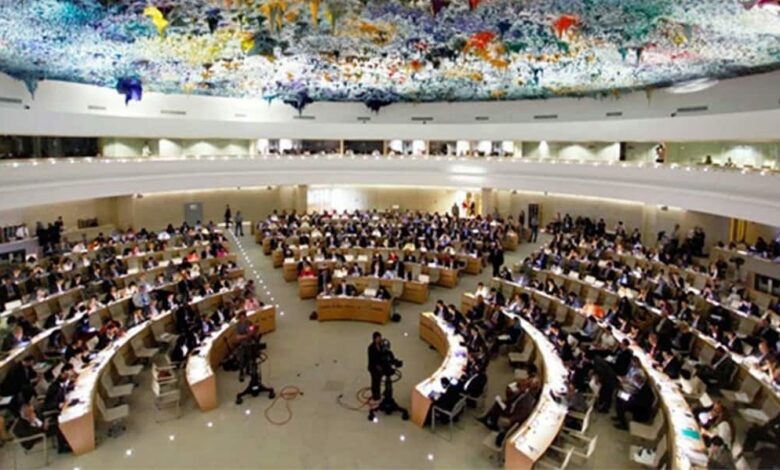Iranian Regime’s Actions Highlight Urgency for Extending UN Mission

Written by
Mahmoud Hakamian
un-human-rights-council-min
Three-minute read
The 55th session of the Human Rights Council, held on Monday, March 18th, was marked by the presentation of a damning report on the human rights situation in Iran by Javaid Rehman, the United Nations Special Rapporteur. Rehman’s report shed light on the alarming escalation of human rights abuses under the rule of the mullahs in Iran, highlighting egregious violations ranging from executions to suppression of dissent and discrimination against ethnic and religious minorities.
Rehman’s report came on the heels of another significant revelation on March 8th, when the United Nations Fact-Finding Mission declared in its preliminary report that Tehran had committed crimes against humanity during the suppression of the 2022 uprising. The mission underscored the regime’s use of disproportionate force to quell dissent, painting a grim picture of the human rights landscape in Iran.
During the session held at the European headquarters of the United Nations in Geneva, Rehman expressed deep concern over the escalating number of executions in Iran, citing a 43% increase in executions in 2023 compared to the previous year. He lamented the lack of access to Iran despite repeated requests throughout his tenure, emphasizing the regime’s unwillingness to engage with international scrutiny.
Rehman’s report outlined a litany of abuses perpetrated by the Iranian regime, including torture, mistreatment of prisoners, and targeted killings of ethnic minorities such as Kurds and Baluchs. He also highlighted the pervasive suppression and discrimination faced by women and girls, noting the use of brutal police tactics against them.
Moreover, Rehman called upon the international community to establish accountability mechanisms to address not only recent atrocities but also long-standing human rights violations, including forced disappearances and arbitrary executions dating back to events such as the 1988 massacre and the November 2019 protests.
Following Rehman’s damning indictment of the regime, representatives of other countries joined in condemning Iran’s egregious human rights record. However, in a brazen display of denial, a representative of the Iranian regime dismissed Rehman’s report as politically motivated and baseless.
In response, Rehman reiterated his disappointment at the regime’s refusal to engage with his mission, questioning why Iranian authorities continued to obstruct efforts to shed light on human rights abuses if they had nothing to hide. He rebuffed accusations of bias, emphasizing the impartiality of his investigations and the urgency of addressing the regime’s atrocities.
#Iran News in Brief
At the 55th session of the Human Rights Council, @JavaidRehman's UN report exposes a concerning 43% spike in executions in Iran, urging global attention to the escalating #humanrights crisis. Calls for justice for 1980 and 1988 massacres.… pic.twitter.com/S2BnyM1Ysq— NCRI-FAC (@iran_policy) March 18, 2024
The March 8th publication of excerpts from the Truth-Finding Committee report marked a significant milestone in the quest for justice and accountability in Iran. The report, which unequivocally denounced the regime’s actions as “crimes against humanity,” called for an immediate cessation of executions and the release of political prisoners.
Sara Hossein, the head of the Truth-Finding Committee, delivered a scathing indictment of the regime’s repressive tactics following the 2022 uprising. She highlighted widespread arrests, torture, and the targeting of women and human rights advocates, emphasizing the systematic nature of these abuses. According to Mrs. Hossein, despite repeated attempts to engage with the Iranian government in good faith, the regime remained obstinate, denying access and refusing to address detailed inquiries.
This development sent shockwaves through Tehran, prompting Gholam-Hossein Mohseni Ejei, the head of the regime’s Judiciary, to respond swiftly. However, his attempt to discredit the report by attributing it to fabricated threats against Iran only underscored the regime’s refusal to acknowledge its own atrocities.
Following the submission of the Truth-Finding Committee’s report, delegates from governments and non-governmental organizations delivered speeches and shared their views on the report. The final speaker was political prisoner Shabnam Madadzadeh, who served a five-year sentence in Evin, Gohardasht, and Qarchak Varamin prisons.
Sara Hossein, chairperson of @UN Independent International Fact-Finding Mission on Iran at #HRC55: highest number of deaths in a single day during the protests took place in Zahedan on #BloodyFrieday on 30 September 2022. @amnesty's analysis: https://t.co/QWoYhpwgk0
— Amnesty Iran (@AmnestyIran) March 18, 2024
Political prisoner Shabnam Madadzadeh’s impassioned speech on behalf of the International Women’s Rights Association further highlighted the regime’s intolerance of dissent. Despite repeated interruptions from the regime representative, Madadzadeh courageously denounced the regime’s crimes against humanity, emphasizing the need for accountability and justice.
The Human Rights Council is now poised to issue resolutions aimed at extending the mandates of the Special Rapporteur on Human Rights and the Truth-Finding Committee.
As human rights violations continue unabated, with impunity reigning at the national level, the work of the Truth-Finding Committee remains indispensable. Its efforts to shed light on the regime’s crimes and hold perpetrators accountable serve as a glimmer of hope for justice and accountability in Iran.
The regime’s brazen aggression towards UN staff during these sessions, conducted openly and in the global spotlight, underscores its blatant disregard for human life and dignity. One can only imagine what atrocities occur in the shadows of its prisons, where dissenting voices are silenced.

